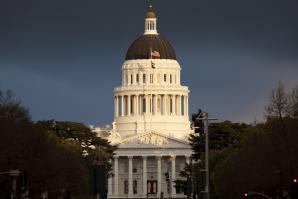John Kabateck was executive director of the California chapter of the National Federation of Independent Business from 2007 to 2015, left to begin his own Sacramento-based public affairs firm, Kabateck Strategies, and returned to NFIB in a similar leadership role on contract in 2018. NFIB was founded in 1943 and has more than 16,000 members in California. Comstock’s spoke to Kabateck about challenges facing small businesses in the Golden State.
NFIB has long polled its members about “problems and priorities.” What issues land at the top?
We know what issues nationally and at the local level continue to resonate among our small-business members: soaring health care costs continue to be a big concern, especially what health care reform means for mom and pops. We were the lead plaintiff challenging Obamacare when it was passed because our members were very concerned about the mandates, taxes, reporting requirements that were really very unfairly disproportionately tilted against small-business owners. In polling, we have found that soaring energy costs (have) historically been second in terms of concerns. … We also found nationally that 45 percent of our members take measures to make their businesses more energy efficient — solar roofs (and) paneling, other methods — without the heavy hand of government ordering them to do so. The rising cost of taxes and the cost of doing business on Main Street (is another concern). … Another issue is frivolous lawsuits and liability. Usually, plaintiffs’ attorneys will target a local salon, a local cafe, a small auto shop, because they are more vulnerable, they have fewer resources, they usually don’t have a legal team that a big corporation does, so they are usually a much easier target … and more likely to settle. … The other issue is the slew of reporting and paperwork that a small-business owner has to do. A small-business owner is expected to be an expert on ever-changing health care laws and labor laws and other tax issues.
Did the 2017 Tax Cuts and Jobs Act provide relief to small businesses?
That is a classic example where we had to educate Republicans and Democrats alike. Republican-led Congress was obviously — as it was making this cake — not thinking at all about Main Street. They had Wall Street in mind and other interests. It took NFIB to loudly speak with a bullhorn and urge them to make sure small businesses had hope and relief and support in this law, and as a result, the most important cornerstone (is) a 20-percent deduction for small businesses. We’re delighted that was included because of our noise; we would just like to make sure our policymakers … make it permanent past 2025.
What other tax issues are on your radar?
There are some specific tax issues this year front and center, (including) sales tax on services. There has been a continued attempt to try to expand what is already the highest statewide sales tax in the nation, which is currently on goods and products, to the services industries. We have a problem with that. A lot of small-business owners have a problem with that and consumers should be up in arms. This most recent iteration applies specifically to business to business. So the sales tax on services would not apply to business to consumer … Jim Relles with Relles Florist in Sacramento has mentioned that he would pay through the nose for his fleet of drivers, for his contractors, for others that provide specific services.
Voters passed Proposition 13 in 1978 because homeowner costs and property taxes were going through the roof, and as a result, it has proven to give great certainty to not just small-business owners and commercial property owners, but to homeowners across the state. There remains an aggressive effort by labor unions to try to poke holes through or completely eliminate Prop. 13 protections on commercial property, claiming that businesses’ property taxes aren’t high enough. … According to (California State) Board of Equalization data, property tax revenues grew from $5 billion in the year following Prop. 13’s approval to $66 billion in 2017-18, an average of 6.9 percent annually. In fact, property tax revenues grew faster than overall growth in the economy, as measured by personal income growth at just 6.1 percent during this same period.
For those who claim our schools aren’t getting enough money from property taxes — when right now 40 percent of the state budget through Prop. 98 must be dedicated to education — it’s patently false for property tax increase proponents to claim that schools need more money. It’s more a factor of our politicians spending the dollars more responsibly, so we are very aggressively involved in a coalition called Fight for Prop 13. There’s a general misunderstanding or false rhetoric that Prop. 13 is protecting only property taxes from larger businesses — the big property owners, the CB Richard Ellises, the David Taylors. … The bottom line is these costs are passed onto small-business owners. Most small-business owners are renters; they do not own their property.
What is the position of NFIB on Assembly Bill 5?
AB 5 is terrible policy that strikes at the heart of entrepreneurism and small-business success in California. It will make it next to impossible for the single parent, college student, senior or everyday Californian trying to make ends meet to find flexible, promising job opportunities in their communities. The bill, signed by Gov. (Gavin) Newsom, is a classic example of “Swiss cheese” legislation that picks winners (a few handpicked industries and jobs championed by powerful special interests at the end of legislative session) and losers (most mom-and-pop businesses) in the Golden State. NFIB will most definitely be taking steps to ensure all small businesses are protected and can continue to survive and grow, be it through legislation or legally, as we move forward, and, in the meantime, make sure our members know what they need to know to be compliant.
What are your thoughts on the California Consumer Privacy Act, set to go into effect Jan. 1, 2020?
Gov. (Jerry) Brown signed into law … legislation that gives consumers sweeping rights and abilities to demand their data from businesses of various levels that involves or includes them — from credit card transactions to online communication to video clips of surveillance video. It was done in the wake of some larger high-profile cases of legitimate data breaches. Without question, small-business owners and consumers alike don’t want their personal information to get to the wrong hands. However, there’s a right way to do policy and a wrong way to do policy. … Both Democrats and Republicans in the Legislature, and the governor, recognize that it was thrown together haphazardly, recklessly and with many, many flaws that now unintentionally put small-business owners in a very difficult position with new costs, reporting requirements and liability. The good news is the law doesn’t go into effect until Jan. 1, and there have been hope for some fixes.
“AB 5 is terrible policy that strikes at the heart of entrepreneurism and small-business success in California. It will make it next to impossible for the single parent, college student, senior or everyday Californian trying to make ends meet to find flexible, promising job opportunities in their communities.”
The definition of what “personal information” is is still very broadly written. … It now can apply to how many times a customer has visited a company website or how many times a customer has been on a surveillance video walking in or out of the business or inside the store. … That may work for a larger corporation that has a team of IT professionals and lawyers and accountants that can organize that, but for a small-business owner that has a cookie store, a bookstore or a restaurant, they will now be required to drop everything, gather that data themselves and lose valuable time working in their business, or more likely hire IT professionals, lawyers, other experts for them, and obviously spend an exorbitant amount of money. We’re asking for clarifying what “personal information” means, clarifying what “consumer” means — the term right now is very broad and could even apply to an employee of a business. … And digital selling and loyalty programs will be severely harmed, if not eviscerated, if the law goes into effect. (We want to) ensure we can preserve loyalty and rewards programs for places like grocery stores, restaurants, retailers.
California recently approved a longer paid family leave — up to eight weeks for each parent. What’s the response of NFIB to this change?
California small businesses are already required to offer their employees the most generous, expensive paid leave programs and workplace benefits. A mandated paid parental leave program adds massive costs to already-fragile mom and pops, which will result, once again, in the law of unintended consequences for workers in our state: scaled-back hours and shifts, reduced benefits, layoffs and for-sale signs on Main Street businesses.
Immigrant small-business owners represent a significant and growing part of the economy, constituting 18 percent of small-business owners. How many of California NFIB’s members are immigrant-owned small businesses? How do you do outreach to this community?
NFIB has many immigrant-owned small businesses, something we know firsthand in our regular meetings with them and all our members. We don’t, however, keep a statistic on how many there are, just as we don’t keep a political party affiliation statistic. What unites all our members is the shared difficulties in running their enterprises, which you can find in our monthly Small Business Economic Trends reports and in our quadrennial Small Business Problems and Priorities study, listing the 75 issue concerns. As with all our members, our main outreach vehicles include state and federal ballots that guide our lobbying strategies in Sacramento and in Washington, D.C.; action alerts; our state and federal webpages; and regular meetings throughout California.
Recommended For You

California Lawmakers Pass Assembly Bill 5. Now What Happens?
Doctors, real estate agents and hairdressers can keep their independent contractor status — but not truckers, commercial janitors, nail salon workers, physical therapists and “gig economy” workers.

Will Assembly Bill 5 Destroy the Gig Economy?
An end-of-session legislative fight has huge implications for companies and their contractors
A momentous Supreme Court decision. A presidential candidate weighing in. A noisy late-August demonstration outside the Capitol. Not Washington, but Sacramento. Not abortion or guns — Dynamex.



